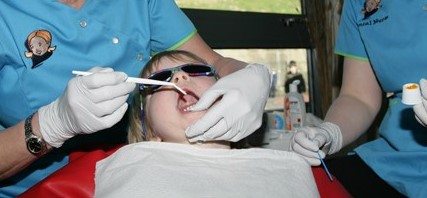The Childsmile Fluoride Varnish Programme uses the preventive measure of fluoride varnish, Duraphat®. It is the only fluoride varnish licensed for caries prevention in the UK at the moment.
Childsmile dental teams; which usually comprise an Extended Duties Dental Nurses (EDDN) trained in the application of fluoride varnish, and a Dental Health Support Worker (DHSW); attend these educational establishments to deliver twice-yearly fluoride varnish applications. They may also promote good oral health behaviour and provide health education. Schools and nurseries will have a designated point of contact within the Childsmile team.
Local Childsmile teams identify nurseries and schools to participate in the programme, based on the proportion of children attending the establishment who live in areas of relative disadvantage. Childsmile uses the data from the Scottish Index of Multiple Deprivation (SIMD), National Dental Inspection Programme (NDIP) and free school meals.

The Childsmile Team support families to ensure that as many children as possible can benefit from the programme. Children are able to join the programme when they start nursery (from two-years-of-age) and remain in the programme, receiving six-monthly fluoride varnish applications for the duration of their time at nursery, often continuing in school.
At all stages in the programme, children who require further assessment and dental advice are identified, and their parents receive a letter informing them of their child’s dental need. If need for advice from a dentist is immediate this should be followed up by direct contact with the parent instead of a letter.
Many scientific studies from around the world have shown that fluoride varnish is effective in reducing the decay rate in children, when used in addition to brushing teeth regularly with fluoride toothpaste. A Cochrane Systematic Review of 2013 confirmed the statistically significant caries-inhibiting effect of fluoride varnish.
How fluoride varnish works:
- it slows down the development of decay by stopping demineralisation
- it makes the enamel more resistant to acid attack (from plaque bacteria), and speeds up remineralisation (remineralising the tooth with fluoride ions, making the tooth surface stronger and less soluble)
- it can stop bacterial metabolism (at high concentrations) to produce less acid.
Fluoride varnish leads to heavy remineralisation of the enamel surface, and subsequent acid attacks will allow fluoride ions to penetrate more deeply into the tooth structure. Varnishes like Duraphat® are useful because they stay on the tooth surface for some hours, allowing slow release of the fluoride ion.
For further information on the Childsmile Fluoride Varnish Programme please see the parents and carers Fluoride varnishing page.
